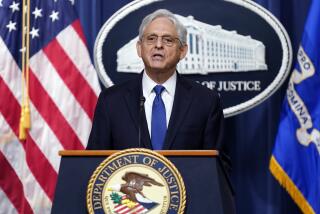Atty. Gen. Holder tries to reassure journalists on leak probes
WASHINGTON — Atty. Gen. Eric H. Holder Jr. and his top Justice Department deputies met with journalists and their lawyers Friday and pledged they would not seek to prosecute reporters under the Espionage Act for reporting and writing stories that may disclose classified information.
Holder and his aides also said they were looking closely at the department’s guidelines that govern how prosecutors can seek information from journalists and news organizations.
The officials focused particularly on provisions in the current rules that in some cases allow the government to obtain records regarding a reporter’s telephone calls or emails. Those rules may need tightening to give news organizations advance notice and an opportunity to challenge the seizures in more cases, the officials suggested.
Under orders from President Obama, the attorney general is reviewing how the Justice Department conducts investigations of national security leaks to journalists. Twice in recent weeks, news organizations learned that their reporters had come under secret surveillance for having published stories that revealed highly sensitive information.
In the case of Fox News reporter James Rosen, an FBI agent had obtained a search warrant in 2009 after asserting he had “probable cause” to believe the reporter had violated the Espionage Act by “aiding and abetting” the disclosure of national security secrets.
That revelation set off alarms at many news organizations, because no journalist has been prosecuted under the Espionage Act. Enacted during World War I, the law targeted spies and those who would aid the enemy, but its broad wording made it a crime to reveal information vital to national defense. Rosen has not been prosecuted.
Responding to the concerns, Obama and Holder have insisted they would not use the law against journalists who report what they have learned.
“Journalists should not be at legal risk for doing their jobs,” Obama said in his May 23 speech on national security.
In meetings Thursday and Friday, Holder and his aides have assured invited journalists and news media lawyers that reporters would not be targeted for criminal prosecution.
Los Angeles Times Washington Bureau Chief David Lauter attended the Friday session.
But the Justice Department officials made no promises that they would not seek phone records or emails from reporters. They acknowledged, however, that the issue of advance notice is a crucial one.
For decades, the department has followed guidelines for investigating leaks. Recognizing “the importance of freedom of the press,” the guidelines said the department’s attorneys “must first attempt negotiations with the media” before seeking court testimony or telephone records from a reporter. But those guidelines include exceptions. Holder indicated that he believed those exceptions needed review and may need tightening.
News media lawyers count on advance notice because it gives them a chance to contest the government’s demand. If the disagreement cannot be resolved through negotiation, news organizations can take the matter before a judge.
Last month, the Associated Press learned the Justice Department had secretly obtained phone records for at least 20 lines used by reporters and editors last spring during a two-month period when AP reported that the CIA had thwarted a plot in Yemen to bomb a U.S.-bound airliner.
Deputy Atty. Gen. James Cole approved that order, and he has continued to defend it as necessary and reasonable.
In the case of the Fox News reporter, Holder had approved the search warrant in 2009. Rosen, who was then covering the State Department, had reported on developments in the North Korean government.
Obama’s advisors on national security pressed for the leak probes because the news stories appeared to reveal that the CIA had relied on an informant inside North Korea.
Obama said he wanted Holder to report back to him by July 12.
More to Read
Sign up for Essential California
The most important California stories and recommendations in your inbox every morning.
You may occasionally receive promotional content from the Los Angeles Times.











